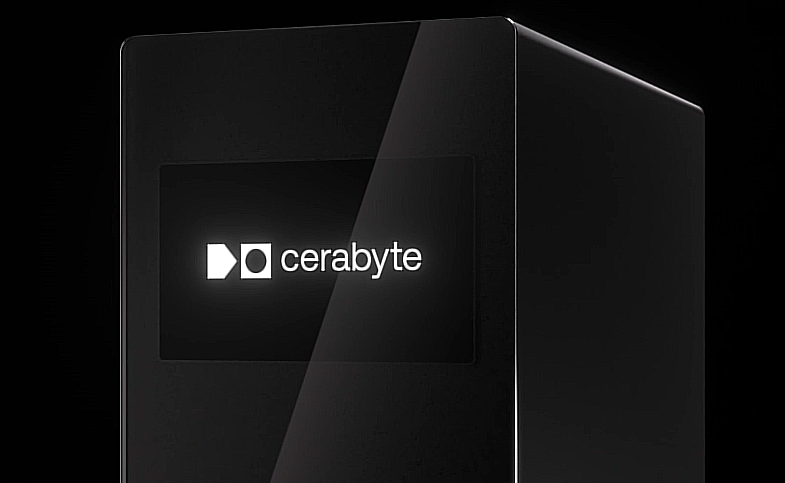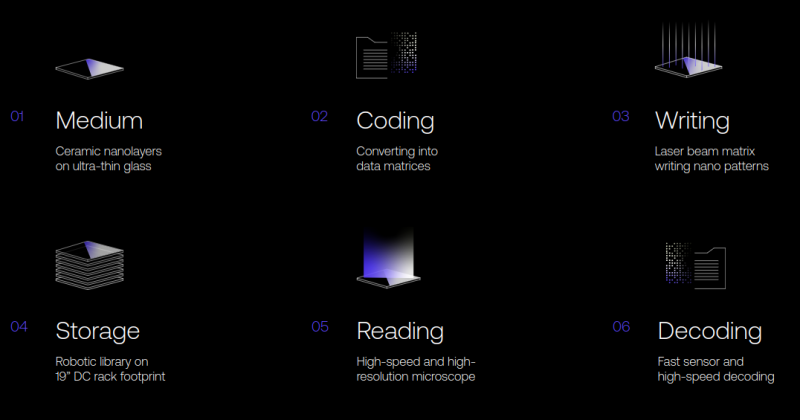 EMERGING TECH
EMERGING TECH
 EMERGING TECH
EMERGING TECH
 EMERGING TECH
EMERGING TECH
Data storage technology startup Ceramic Data Solutions Holding GmbH, better known as Cerabyte, said today it’s bringing its novel ceramic data storage offering to the U.S. market, as part of its ambition to transform the way long-term archival data is stored.
The startup is pioneering the concept of “Ceramic Nano Memory,” which makes use of a cost-effective flexible glass material for data storage and supports blazing fast write/read operations for large volumes of archival data. As part of its U.S. expansion, it has established two offices, in Silicon Valley and Boulder, Colorado.
Cerabyte says its unique data storage product is able to store information for a virtually unlimited time, reducing the total cost of ownership in data centers by an order of magnitude, due to its lower costs. It explains that physical bits are ablated onto recyclable ceramic-on-glass sheets, which can retain that information forever, without any energy source. Its technology has a “zero-power footprint” and doesn’t suffer from “bit rot,” even when it’s placed under extreme conditions.
These capabilities mean its persistent and immutable ceramic-based storage arrays can store information for extremely long periods without any degradation, eliminating the need for periodic refreshes, data migrations and maintenance, while simultaneously enabling high performance in terms of read/writes.
Because its ceramic storage media has exceptional longevity and supports rapid access, the company believes it’s well-placed to help solve industry challenges around long-term archival data, making that infrequently accessed data available extremely rapidly when it’s required.
The startup claims that a new kind of storage medium is going to be necessary, and soon, for the vast majority of the world’s information is likely to be stored as long-term archival data in the coming years, thanks to the exponential growth of artificial intelligence and data analytics. The coming explosion of data forecast by so many analysts is expected to cause some major headaches over how it can be stored, as existing archival storage technologies, such as hard drives, are expensive, complex to manage and at risk of security breaches. They also present problems in terms of rapid data access and sustainability.
Cerabyte believes that what companies will want is an affordable, yet easy-to-access storage medium, so that this information can be used quickly when they need it, and safely stored at low costs when it’s not being used.

Steve McDowell of NAND Research Inc. told SiliconANGLE that the long-term archival of data is a major challenge that the technology industry has yet to solve. Most archived data today is stored on magnetic tape, in hard drives, or in optical-based storage solutions, but neither is durable over long horizons, he said.
“Tape degrades over time, needing to be refreshed, while optical storage fails to reliably store bits over the long haul,” he said. “It lasts longer than tape, but it still degrades over decades-long periods.”
The problem for the storage industry is that there is a growing class of data that needs to be stored for as long as humanity will exist, McDowell said. He explained that the majority of human knowledge today lives in digital form, and its long-term storage is going to be a real challenge for archivists in governments, universities, research facilities, libraries and other organizations tasked with maintaining this information in perpetuity.
According to McDowell, there are two approaches to long-term data archival storage, namely DNA storage and glass-based storage. Of the two, he said, glass is the most promising and will most likely become commercially available first.
Though startups such as Biomemory SAS and Catalog Technologies Inc. claim to be making rapid progress in DNA storage, McDowell said those companies are unlikely to be able to bring their products to mass market anytime soon.
“Cerabyte’s solution is the closest solution to being practically available,” he said. “The company’s ceramic-based solution can store data with high data densities that can last for centuries – the challenge then becomes how to keep technology alive that can read the ceramic disks, but that’s a problem we can solve down the road.”
Cerabyte co-founder and Chief Executive Christian Pflaum told SiliconANGLE that the company’s vision is to slash archival data storage costs by up to 1,000 times over the next decade, enabling enterprises to store information for as little as just $1 per petabyte per month.
“Cerabyte is prepared to transform how data is stored and address the urgent cost and sustainability demands of data centers,” Pflaum insisted.
The company said its technology roadmap builds on an amortized semiconductor fabrication tool technology that it has specially adapted for data storage applications. It uses regular display glass as the basis of its ceramic-on-glass sheets, which are then stacked inside LTO tape-sized cartridges that leverage existing library automation technologies.
It has also developed specialist software to encode the binary data that’s ablated onto those glass sheets. This process is performed using “femtosecond lasers” and a digital micromirror device to create nanoscale holes in the ceramic layer with each pulse. To read the data, it uses microscopes to scan the ceramic-on-glass sheets in milliseconds.
Because the data is essentially just etched onto glass, it will remain readable for many, many years, without any power supply, Pflaum explained.
McDowell said Cerabyte’s glass-based storage system is not only closer to commercialization that the DNA storage that most of the industry is betting on, but is also more advanced than rival glass storage systems, such as Microsoft Corp.’s Project Silica.
“Microsoft doesn’t use ceramic technology, instead etching data directly onto glass platters,” the analyst explained. “Most critically, the company has never talked about commercializing the technology, though that can change in an instant. But for now, Cerabyte has a nice window of opportunity to move the market with its ceramic-based approach.”
The biggest challenge for Cerabyte will be to show that its technology is genuinely more efficient than the industry-standard tape and optical storage products available now.
“It’s a complex challenge and I think its earliest successes will be with the cloud hyperscalers and service providers, as that’s where most businesses are really archiving their data, trusting it to services such as Amazon S3 and the like,” McDowell said. “Beyond that, institutional archivists are an ideal market for Cerabyte.”
Fred Moore, an analyst with Horison Information Strategies, was even more enthusiastic, hailing Cerabyte’s technology as one of the most disruptive and exciting developments in the digital data storage industry. He explained that data center operators believe the future lies in storage mediums that don’t consume energy when the information they hold isn’t being accessed. They need to achieve this, because it won’t be feasible to use existing storage technologies to store the vast amounts of data that will exist in the next few years, he added.
“A staggering 60% to 80% of all data is archival/cold, much of which is stored on energy-inefficient HDDs,” Moore said. That number will likely grow, he added, as studies show that the amount of “cold data” in the world is expected to exceed 6 zettabytes by 2026. “Reducing heavy energy consumption now sits squarely in the bull’s-eye for most data centers.”
Support our mission to keep content open and free by engaging with theCUBE community. Join theCUBE’s Alumni Trust Network, where technology leaders connect, share intelligence and create opportunities.
Founded by tech visionaries John Furrier and Dave Vellante, SiliconANGLE Media has built a dynamic ecosystem of industry-leading digital media brands that reach 15+ million elite tech professionals. Our new proprietary theCUBE AI Video Cloud is breaking ground in audience interaction, leveraging theCUBEai.com neural network to help technology companies make data-driven decisions and stay at the forefront of industry conversations.